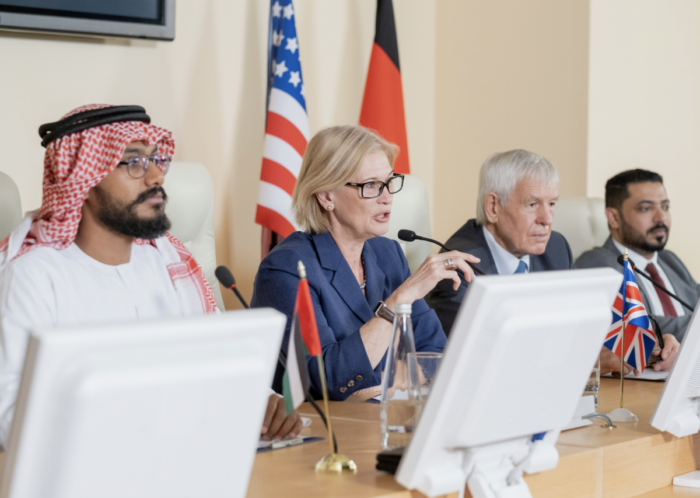In an age where sustainable development is more pressing than ever, board members are uniquely positioned to shape strategies that address both present and future challenges. Drawing on lessons from global diplomacy, a recent Boards Impact Forum webinar offered insights into building resilient, sustainable business models that align with global goals.
The session highlighted five key diplomatic principles that can guide boards in this transformative journey: Health for All, Culture as Infrastructure, Discovery Research Fund Approach, Transdisciplinary Research, and Futures Studies. These principles, originating from Transdisciplinary Systems Research, serve as a foundation for leading change and enhancing organizational impact in a rapidly shifting world.
Listen to the follow-on AI supported discussion diving into the insights shared:
Table of Contents
Five Ideas from Global Diplomacy for Boards
Global diplomacy’s approach to collaboration and proactive engagement offers valuable lessons for boards navigating complex sustainability landscapes. These are based on a research and book by Marvin Cheung, business executive and global governance scholar, Center for Global Agenda (CGA), co-director at the Venture Strategy Group (VSG) and director at Unbuilt Labs and Dr. Marguerite Van Cook, Board President (Non-Executive Chair) at Visual AIDS and Adjunct Professor at Columbia University and the Fashion Institute of Technology (FIT),

These five principles, adapted for board governance, emphasize the need for a method-oriented approach rather than simply pursuing end goals.
1. Health for All: By focusing on social impact measurement, particularly through health outcomes, boards can guide investments that create meaningful, measurable impacts aligned with sustainable objectives.
2. Culture as Infrastructure: Culture is foundational. Boards should enable stakeholders to shape an organizational culture that reflects shared goals and sustainable practices.
3. Discovery Research Fund Approach: Just as small grants can empower exploratory research in diplomacy, boards can foster innovation through flexible, collaborative funding structures.
4. Transdisciplinary Research: Partnering with institutions and communities bridges knowledge gaps and promotes mutual learning, helping to define priorities with diverse perspectives.
5. Futures Studies: Scenario planning empowers organizations to envision and prepare for future changes, fostering resilience and adaptability in a fast-evolving world.
By adopting these ideas, boards can guide their organizations in ways that promote collective resilience and support global sustainable development.
The Diplomatic Approach to Sustainable Business

Marvin Cheung, co-author of *Five Ideas from Global Diplomacy*, advocated for systemic change at all organizational levels, emphasizing the importance of sustained engagement. Cheung highlighted that addressing complex issues like climate action requires moving beyond traditional goal-oriented strategies. Instead, boards should cultivate a “method-oriented” approach, where social progress through macro and micro-interactions is prioritized. This approach enables organizations to tackle challenges incrementally, making meaningful progress through continuous, focused engagement rather than attempting to address everything at once.
Practical Implementation of Diplomatic Principles at the Board Level

Dr. Marguerite Van Cook provided actionable insights on how boards can apply diplomatic principles to board governance. For example:
– Social Impact Measurement: Dr. Van Cook suggested tracking health outcomes as part of impact investments, adding a layer of accountability and coherence to sustainability initiatives.
– Board Apprenticeships and Innovation: Introducing board apprenticeships encourages fresh perspectives and organizational agility. Additionally, funding small research projects promotes collaboration across disciplines and fosters a proactive stance on sustainable practices.
These practices help boards navigate evolving sustainability challenges while keeping their governance responsive and forward-looking.
Climate Diplomacy: Navigating Climate Risks

Mattias Frumerie, Sweden’s Climate Ambassador and Sweden’s chief negotiator for the climate negotiations within the UNFCCC, stressed the importance of aligning business strategies with global climate goals, such as those outlined in the Paris Agreement. He emphasized that climate risk assessment and proactive scenario planning are essential for preparing organizations for climate change’s physical and financial impacts. Frumerie encouraged boards to view the climate crisis not only as a risk but also as an opportunity for innovation. By incorporating sustainable practices into their strategies, businesses can unlock new growth opportunities while contributing positively to global climate goals.
Balancing Short-Term Profitability with Long-Term Sustainability

A recurring theme in Irina Frolova-Verned, Independent Chair Investment Committee Natural Capital Fund at Climate Asset Management, NED and Chair Audit Committee Stockholm Exergi (Sweden) and HZPC (Netherlands), discussion was the tension boards face in balancing immediate financial pressures with long-term sustainability. She highlighted that scenario planning is a critical tool for managing this balance. Boards are encouraged to evaluate the risks and potential impacts of inaction, recognizing that sustainability is a future-proofing strategy. By embracing models that prepare for “Net Zero” and “nature positive” futures, boards can help ensure business continuity and relevance in a rapidly transforming landscape.
Conclusion & Key Takeaways
The Boards Impact Forum webinar reinforced that board members must actively integrate diplomacy-inspired practices to meet today’s complex sustainability challenges. Some essential takeaways include:
– Balancing Profitability with Sustainability: To maintain relevance, boards need to focus on long-term sustainability, making decisions that support a sustainable future.
– Alignment with Climate Goals: Climate diplomacy requires boards to align strategies with international agreements, prepare for climate-related risks, and identify opportunities for innovation.
– Practical Application of Diplomatic Principles: Social impact measurement, collaborative research funding, and transdisciplinary initiatives can enhance an organization’s adaptability.
As a final thought, reskilling talent for sustainability and AI is essential. Advisory boards and partnerships with academia offer quick wins that can help boards navigate the complexities of sustainability governance. Applying diplomatic principles—focusing on purposeful interactions and sustained engagement—provides a valuable framework for boards to embrace the sustainable development challenges of today and tomorrow.
Learn More
Relevant Blogpost, Webinars & Peer Exchange
Read the original earlier blogpost and see the webinar recording;
Webinars, Peer Exchanges and Events
Join us for the insightful webinars and peer exchanges
November 12 at 12-13.30 PM CET (new date), “Boards role in Embedding Sustainability and SDGs: How to Drive Organizational Transformation,” hosted by Boards Impact Forum in collaboration with the Scandinavian Executive Institute. Tailored for board directors, this session focuses on integrating sustainability into all aspects of operations to boost performance and long-term success. Renowned Non-Executive Board Director, Former Sustainbility Director at IKEA Pia Heidenmark Cook will present insights from her book, drawing on her experience at IKEA, as well as NED, to offer practical tools and strategies for overcoming challenges in sustainability. She will be joined by a panel of NEDs including Julie Baddley, NED at commercial companies as well as Chair of the Climate Governance Initiative and Lars Husberg, Chair at several Family Business.
November 28 at 13.00-14.30 PM CET “Strategic Governance in a Disrupted World” delving into key findings from a joint research study, conducted by INSEAD Corporate Governance Centre, BCG, and Heidrick & Struggles and discussed in a panel with trailblazing board directors. Research study presented by Alice Breeden, Heidrick and Struggles and Ron Soonieus, BCG & INSEAD. Panel with Susanna Campbell, Chair at Syre and NOD, Board Director at Stegra, Northvolt, Kinnevik, Indutrade, Estrid, Johan Raslan, independent board director at Sime Darby Property Berhad, Institute of Corporate Directors Malaysia, the Malaysian Securities Commission, Climate Governance Malaysia and Dr Patricia Rodrigues Jenner is Non-Executive Director, Porfolio NED. Comments by Sonia Tatar INSEAD and facilitated by Liselottte Engstam: Chair of the Boards Impact Forum,
Board Programs
“Boards Oversight of Sustainability“ sign up before November 5
“Boards Oversight of Responsible AI”
Join as Member
(free of charge for board members)
Boards Impact Forum, Join here
Support as Partner
We are looking for Supporting Partners, Learn More
About Boards Impact Forum and the blogpost
Boards Impact Forum is the Nordic chapter of the Climate Governance Initiative from the World Economic Forum.
This blogpost is authored by Chair Boards Impact Forum, Board Member at Climate Governance Initative, Chair and Ned at Listed and Private Companies Liselotte Engstam. Illustrations by Unsplash+
Events arranged by Boards Impact Forum in collaboration with World Economic Forum (Non Profit Board Network, partnering with Board Networks , INSEAD Corporate Governance Centre, Digoshen and Next Agents )





Recent Comments